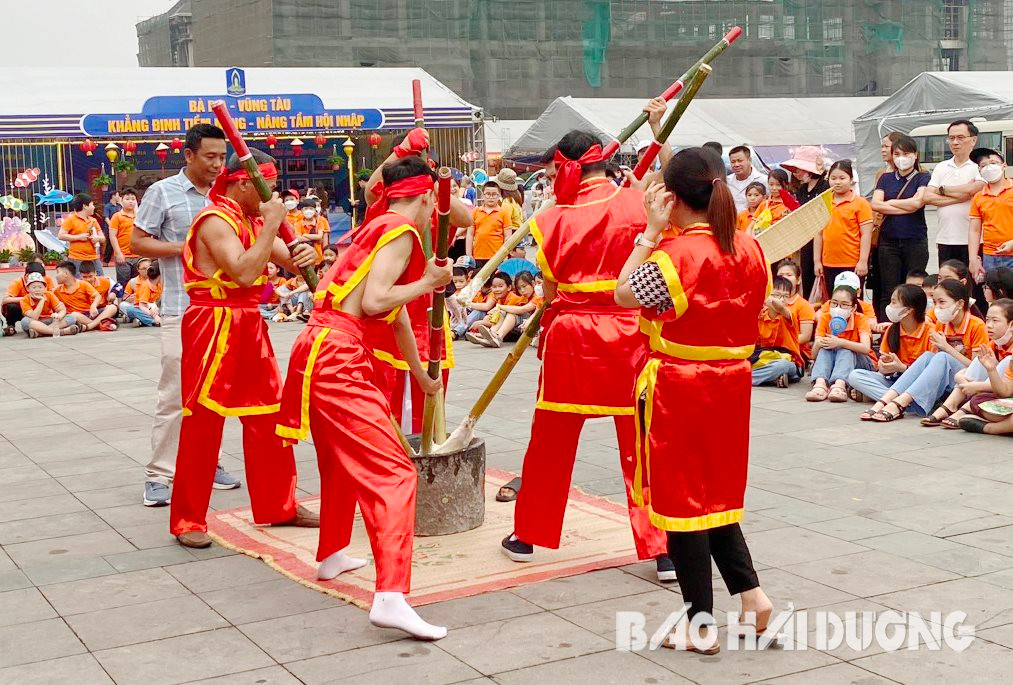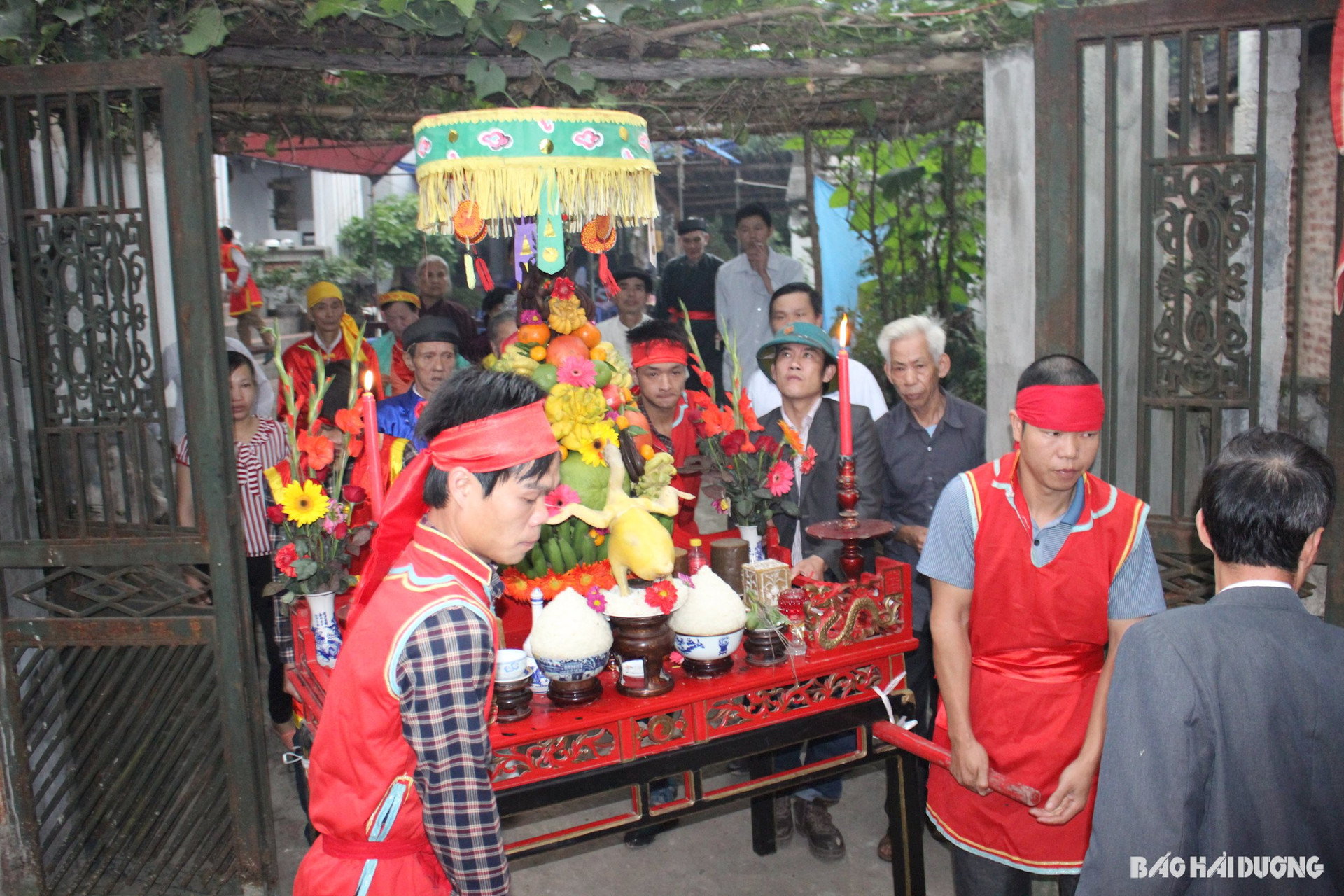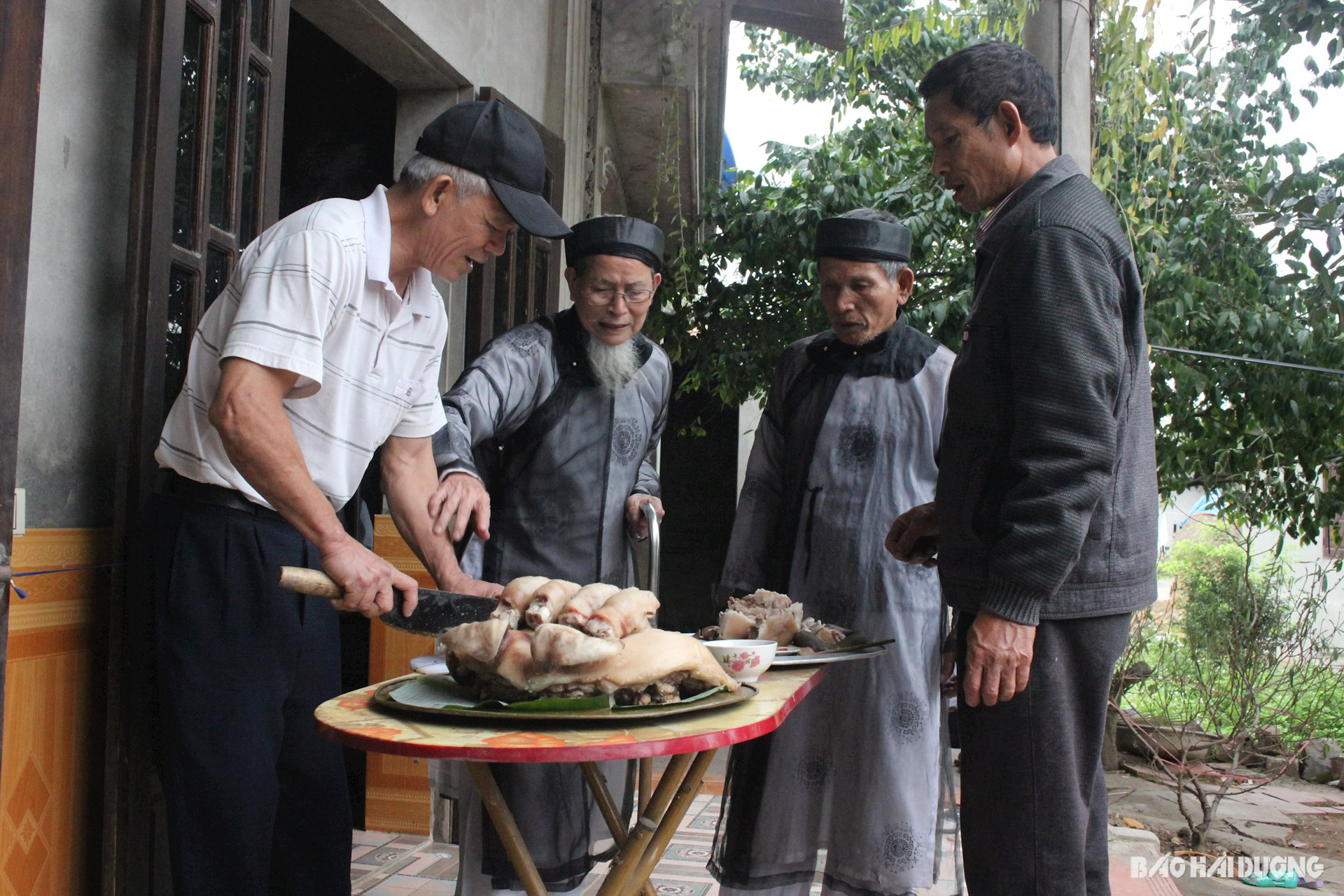During festivals, each offering to the King by the people is imbued with traditional cultural values, a filial heart, and sincere gratitude to the ancestors.

Due to the characteristics of agricultural residents, rice grains are considered a treasure, a "jade food" that nourishes people. Therefore, offerings to the King on important occasions cannot lack products made from rice grains. Legend has it that Prince Lang Lieu, the son of the sixth Hung King, was taught by a god in a dream to make banh chung and banh giay to offer to his father and inherit the throne. Since that day, square banh chung symbolizing the earth and round banh giay symbolizing the sky have become typical offerings to ancestors. Currently, in villages where worshiping the Hung Kings is practiced, most residents consider banh chung and banh giay as mandatory offerings on the worshiping tray.
For many years now, on the occasion of the Hung Kings' Commemoration Day - Hung Temple Festival every year, Phu Tho province has organized a competition to wrap, cook and pound traditional Chung cakes. The teams that win first prize will have the honor of making Chung cakes and Giay cakes for the offering tray to King Hung during the incense offering ceremony on the 10th day of the third lunar month.

As Vietnamese, everyone knows the legend of the 18th Hung King choosing a son-in-law with the request for gifts of “nine-tusked elephant, nine-spurred chicken, nine-red-haired horse”. Not entirely fictional, in the land of Xuan Son (Tan Son district, Phu Tho province), the precious breed of chicken with many spurs is still preserved, in which, roosters with nine spurs are all chosen as offerings.
Along with the precious multi-spurred chicken breed, the selection of ceremonial chickens in the process of practicing rituals and worshiping the Hung Kings in Phu Tho has many unique features. The ancient village of Hung Lo (Viet Tri city) worships the Hung Kings as Thanh Hoang. Here, on the 10th day of the third lunar month, the Hung King worshiping ceremony is associated with the traditional festival of planting palanquins for worship, then carrying them to Nghia Linh. According to legend, long ago, when King Hung and his army went hunting in the Thanh Son and Thanh Thuy forests, the hunt yielded many rare wild chickens. On the way back to the capital, passing through Hung Lo (Ke Xom) land, the king ordered them to stop to rest and slaughter chickens to treat the army and villagers. Since then, the villagers together built Hung Lo communal house and every year, on the occasion of the King's death anniversary, the whole village gathers to hold a festival, choose chickens for worship, offer at the communal house, then place them on palanquins to carry them to Nghia Linh to present to the Hung Kings.
One of the rituals serving the main festival day is preparing the worshiping chicken. Right from the beginning of the new year, the villagers gathered to vote for the person responsible for making the worshiping food and raising the worshiping chicken. The raising process must strictly follow the regulations on food and care with respect and high responsibility. On the festival day, any chicken selected for the worshiping food is called "Mr. Chicken". The person who slaughters the chicken and is responsible for boiling the chicken is also chosen from experienced people, who have experience in slaughtering, know how to bend the chicken's neck, thread the wings and put it into the boiling pot. The pot for boiling the "Mr. Chicken" must be a large copper pot, which has been cleaned of rice husks before. The water must be taken from the village well, or sometimes from the middle of the Red River.
Like Hung Lo, many localities are even more meticulous in selecting, caring for, and preparing the ceremonial chicken. Even when boiling, the chicken is not dipped in the pot but carried by two people, while others use ladles of boiling water to continuously pour over it for a long time, ensuring that the chicken does not crack, does not have broken legs, is fully cooked, and has beautiful golden skin...

One of the familiar offerings in the Hung King worship rituals in Phu Tho is black pork, associated with the unique hem sacrifice belief. Legend has it that on an early January day, King Hung, his son-in-law Tan Vien and his courtiers went hunting. Arriving at Van Luong village (Van Phu commune, Viet Tri city today), King Hung and his hunting party suddenly saw a herd of wild boars appear, aggressively charging straight at the king and his subjects. King Hung raised his bow to shoot, but Tan Vien quickly stopped him and asked his father for permission to show off his skills. As soon as the king nodded, Tan Vien quickly rushed in with his bare hands and captured the leader pig alive. The remaining pigs were scared and scattered into the forest. King Hung was very pleased and ordered the pigs to be killed in celebration. The pork was divided into six parts, five parts were used to treat the soldiers and local people, and one part was sent to Tan Vien to bring back to his mother.
Since then, to remember the Hung Kings' merits, the villagers built a temple right on the land where the king gave wild boar meat to his soldiers in the past, and annually organize a "fishing" festival to recall the king's hunting story.
From the ceremonial pig to the person who takes care of it, slaughters it, and prepares it, the villagers choose it very carefully and strictly. The pig used for the ceremony must be a male, pure black pig. The family raising the pig must be well-off, follow both village and national customs, have harmonious husband and wife, and have no funerals during the year. The person chosen to bleed the pig must be middle-aged or older, have prestige in the village, and must abstain strictly: not eating onions, pickled onions, not attending funerals or eating at funerals; the body must be clean before the festival...
Also using black pigs as offerings, in the festival "Welcoming King Hung back to the village to celebrate Tet", the residents of He village (currently Vi village and Treo village, Lam Thao district) organized a pig hunting ceremony, a local custom called "running from the enemy". Representatives of the two villages carried two large, strong, jet-black pigs from their villages to the festival grounds. While the villagers surrounded them, cheering, beating gongs and drums loudly, two groups of young men rushed in to herd the pigs all over the grounds. When the two pigs were no longer strong enough to run, the two groups rushed in to capture them and bring them to their village communal house yard to slaughter and process them into offerings to King Hung...
VU THANH